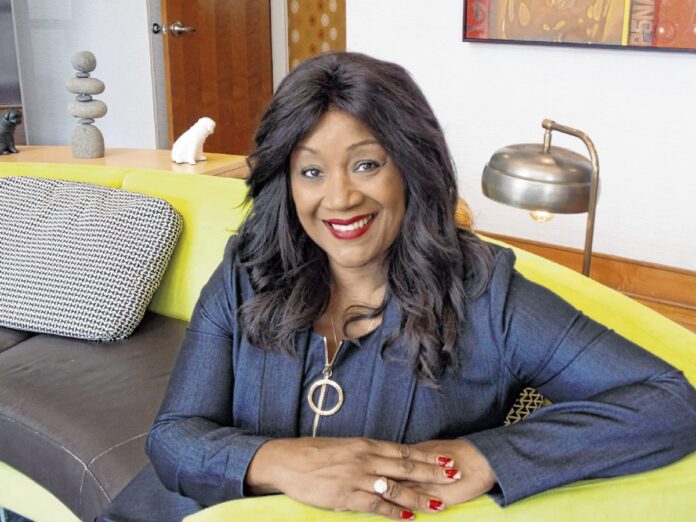
She can still hear the church bells ring atop Second Baptist Church as if she’s back home again in that little yellow house where she grew up.
It was that house on Ninth Street, the one her father painted yellow — leaving the neighbors appalled — that Kimberly Easton called home. It was a safe haven — the place where Easton could be her exuberant self.
Just a few steps away from Ninth Street and out of the red-lined neighborhood where black people could actually purchase homes at the time, Easton felt like she was the only one. The only one in her class that looked like her.
The only one in the Columbus North High School Debuteens and Pepsteppers who looked like her.
[sc:text-divider text-divider-title=”Story continues below gallery” ]
“No matter what I did, I was invisible,” Easton said. “Nobody really immersed themselves or went out of their norm to find out about my culture; about who I am as an African American; why I was different. There was never really any curiosity. ‘You’re here because you’re talented enough to be here and nobody can refute that, however, you’re not really a part of us.’”
But she didn’t internalize people’s feelings about her. She just went to school and got the job done so she could one day leave Columbus and explore what the rest of the world had to offer.
She recognizes, however, there are a lot of students in the school today who don’t know how to do that — who aren’t able to manage feeling like “the only one.”
In her new role as director of multicultural diversity at Bartholomew Consolidated School Corp., Easton is taking steps to prevent anyone from feeling like they’re “the only one.”
“I’m very grateful for the opportunity here to help students of color navigate the process when they’re a minority out of 68 percent white (BCSC population),” Easton said.
‘Show me your childhood’
When Easton came back to Columbus just before taking on this new position, Jamie Jackson, who Easton was mentoring, begged her to tour the city that Easton once called home before pursuing higher education at age 18.
“’Kimberly Easton! Show me your childhood!’” Easton recalled Jackson saying. “I said, ‘OK! Let’s do this.’ So, we jump in the car. He wanted to see my elementary school, my middle school, my childhood home.”
They first drove to Columbus Signature Academy — Lincoln Elementary where Easton was one of the first students to attend the school after it was built. Then, they were off to Central Middle School, but what Easton didn’t know was that the old middle school had been demolished and replaced with a new Central Middle School.
“They tore it down,” Easton said. “It’s gone. I said, ‘I’m traumatized. They’re erasing my childhood memories. Why would you ask to me drive around and show you my childhood when it’s missing?’ So, I decided to take him to my childhood home.”
What awaited her was not the little yellow house on Ninth Street, but instead a parking lot built for Second Baptist Church.
“I loved it. I loved every bit of that little yellow house,” she said. “We go to Ninth Steet and it is torn down. It’s destroyed. I just never thought to jump in my car and revisit my childhood. I never really had a purpose to do it until somebody asked to know more about me and where I came from.”
It was at Columbus North High School where Easton began to truly feel as though she was different. All her childhood friends had gone to Columbus East High School, and she was right on the line to attend Columbus North.
Easton walked one-and-a-half miles to and from school each morning and afternoon. She said she was the first African American to be a Debuteen, but never felt like she was a part of the group — she was “just there.”
“When I auditioned, I made the group,” Easton said. “I studied opera, and they couldn’t dispute my talent when it came to singing. I was of added value.”
Easton said while she was fortunate enough to have a choral director who recognized that the group could benefit from having Easton join, she was still just there.
“I started to realize I was only going to be here for a short while, and I may never even see half the people I went to high school with again, so I don’t really have to internalize their feelings about me,” Easton said.
“I’m here to learn and get as much out of this so I can go to college and experience the world. I always knew there was something outside Columbus — that there was a big world out there and I could go to school every day feeling miserable or I could go to school and make the best out of my life and keep it moving. I chose the latter — to remain positive.”
A whole new world
At 18 years old, Easton moved to Lynchburg, Virginia, where she attended Liberty University, a four-year {span}evangelical Christian{/span} college.
Her new roommate had never seen a black person before. Easton remembers seeing her roommate cower in the corner of her bed in fear. She had to remind her that she, too, bleeds red just like everyone else.
“I used to say I’m really tired of educating other people about my culture,” Easton said. “I’m exhausted. I think it’s because I’m friendly and approachable that people would come up to me. Those who wanted to go outside their norm and learn about another culture would ask me questions, and I would educate them.”
People would ask Easton questions about how she managed her black hair, what she liked to eat and how her family celebrated holidays.
That’s when she discovered that she had the burden of representation. She had one of two things to do.
“I needed to realize I may be the only black person somebody may see, and I can either reinforce their belief system about African Americans, or I can change them,” Easton said. “I have one opportunity to do that. It’s a huge burden of representation when you’re always the only one, but it was something that God said, ‘This is your charge. This is what I’ve given you to do.’”
‘We’re all flowers’
Like an Asiatic lily requires a different environment and amount of water than a honeysuckle, Easton says people are like flowers.
“We’re of different cultures, and diversity matters,” she said. “We’re realizing that we need to be applying how we treat flowers to who we are as people. If God wanted us all to be the same, we would all be the same. There’s something we’re supposed to glean from each other and learn and grow and appreciate.”
Easton said she applauds BCSC for its transition to the Universal Design for Learning framework, which meets students at their individual learning levels.
Growing up, Easton said she was raised in a generation that repeated over and over again, “The mind is a terrible thing to waste.”
“The educators realized that, and they focused on, giving us the starting blocks to treat everyone equally, and that was a time when we were all trained to be colorblind,” Easton said. “We’re making a huge switch now and saying, ‘No, cultural diversity does matter, and we’re not meant to be colorblind.’ We can’t be colorblind.”
For nearly 30 years, Easton has traveled the country as a broadcast news reporter in Virginia, California, Michigan, Chicago and Pennsylvania. In each one of those places, Easton said she experienced several types of discrimination, from covert discrimination in Lynchburg, Virginia to socio-economic discrimination in Grand Rapids, Michigan.
It was in Lynchburg, where she went to college at Liberty University and had her first job as a radio news reporter, that she encountered racism disguised by southern hospitality. She remembers seeing confederate flags swaying in the wind, but was always invited in for a glass of iced-cold sweet tea.
In her interview for the position at BCSC, Easton said she was asked how she felt when she saw a person driving around with a confederate flag. She said it makes her “horribly sad” for that individual.
“They have shut themselves off from learning about people who don’t look like them,” she said. “They are cheating themselves of so much. People select people they’re comfortable with. Some call it pride; some call it history — but you are cheating yourself out of so much when you don’t get to immerse yourself and understand another person’s culture.”
Coming home to Columbus this year, Easton said she found a gold mine.
“I went from overt to covert to socioeconomic to separate but equal to Columbus,” Easton said. “You can experience the world here. You don’t have to go anywhere — you can experience the world in Columbus, Indiana. This is a gold mine.”
As director of multicultural diversity in a corporation with more than 2,100 non-native speakers with a first language other than English, Easton said her No. 1 goal is to ensure all students use Columbus as an opportunity to immerse themselves in different cultures so that no one is the only one.
Her major objectives are to provide diverse curriculum, recruit and retain minority students and teachers, facilitate implicit bias training and engage parents in the lives of their students.
“I do believe that my journey has led me to this position for such a time as this,” Easton said. “We know our climate is political and things are not the way we want to see them. It doesn’t look like a time of peace the way it should be. If I can be here to help students, parents; I was prepared.”
[sc:pullout-title pullout-title=”About Kimberly Easton” ][sc:pullout-text-begin]
Kimberly Easton
Age: 54
Hometown: Columbus
Education: Liberty University – B.S. Degree, Telecommunications (1983 – 1987); Regent University – M.A. Degree, Communications Arts (2011 – 2013)
Career: News reporter and anchor, WZZM; News reporter and anchor, WPXI-TV; News reporter, Fox 40 News; News reporter and anchor, CBS Newsradio Chicago; CEO, KEI Connects; Director of Multicultural Diversity, Bartholomew Consolidated School Corp.
[sc:pullout-text-end][sc:pullout-title pullout-title=”Pull Quote” ][sc:pullout-text-begin]
“I needed to realize I may be the only black person somebody may see, and I can either reinforce their belief system about African Americans, or I can change them,” Easton said. “I have one opportunity to do that. It’s a huge burden of responsibility when you’re always the only one, but it was something that God said, ‘This is your charge. This is what I’ve given you to do.’”
Kimberly Easton
Director of multicultural diversity at Bartholomew Consolidated School Corp.
[sc:pullout-text-end]




